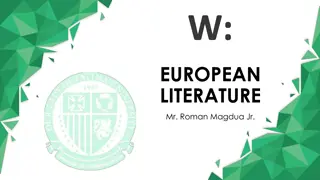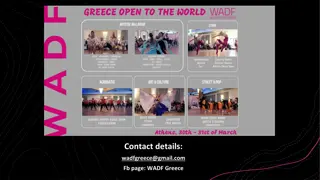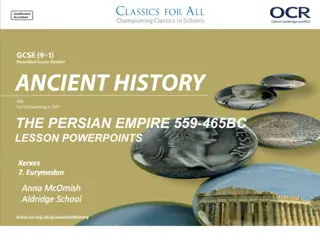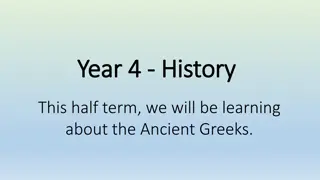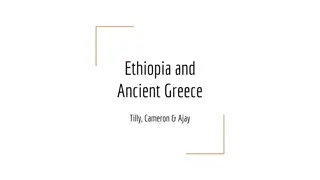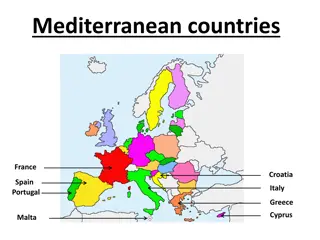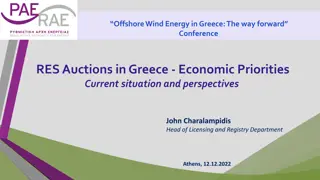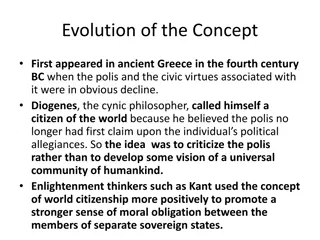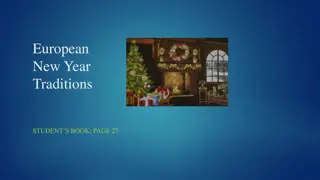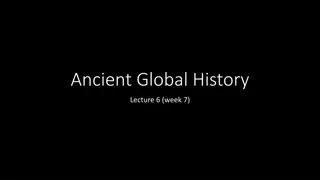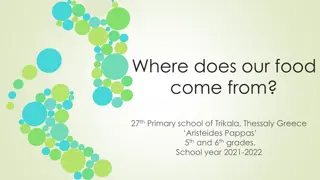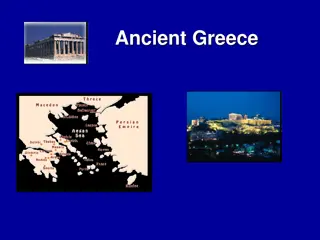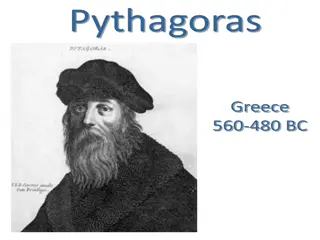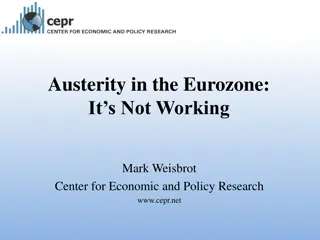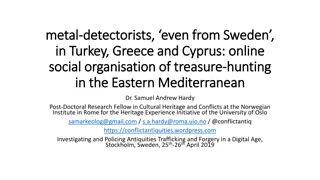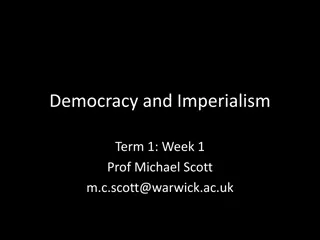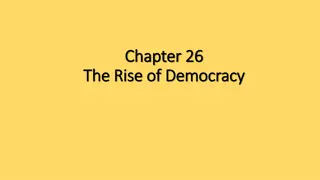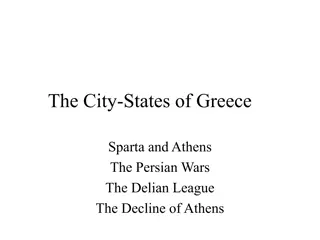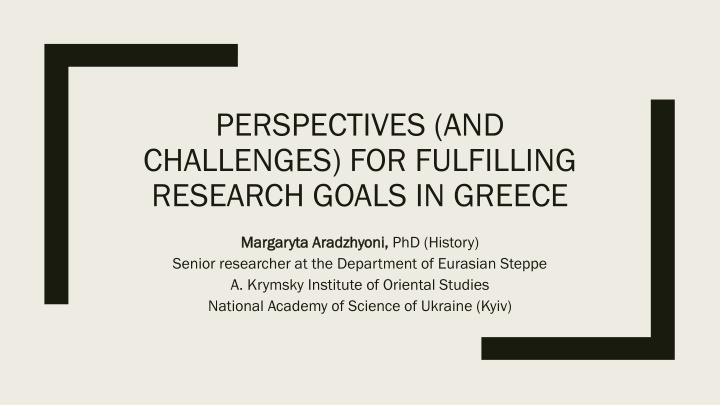
Research Perspectives and Challenges in Fulfilling Academic Goals in Greece
Explore the journey of Margaryta Aradzhyoni, a dedicated historian seeking to preserve the history of Greek communities, faced with challenges due to geopolitical events. Learn how her research is evolving in Greece, supported by academic colleagues at Aristotle University.
Download Presentation

Please find below an Image/Link to download the presentation.
The content on the website is provided AS IS for your information and personal use only. It may not be sold, licensed, or shared on other websites without obtaining consent from the author. If you encounter any issues during the download, it is possible that the publisher has removed the file from their server.
You are allowed to download the files provided on this website for personal or commercial use, subject to the condition that they are used lawfully. All files are the property of their respective owners.
The content on the website is provided AS IS for your information and personal use only. It may not be sold, licensed, or shared on other websites without obtaining consent from the author.
E N D
Presentation Transcript
PERSPECTIVES (AND CHALLENGES) FOR FULFILLING RESEARCH GOALS IN GREECE Margaryta Aradzhyoni, Margaryta Aradzhyoni, PhD (History) Senior researcher at the Department of Eurasian Steppe A. Krymsky Institute of Oriental Studies National Academy of Science of Ukraine (Kyiv)
My background and academic goals For more than 30 years I have been doing applied research in history and culture of national minorities in Ukraine and worked to foster their social inclusion in Ukrainian society. The focus of my research has been on the history and tradition of the Crimean Greeks and the Mariupol Greek community. The latter comprises of 77.500 people according to the 2001 census. Until 2014, I worked as the Head of the Department of the Crimean branch of the Institute of Oriental Studies of the National Academy of Sciences of Ukraine. Due to the Russian occupation of the peninsula, I was forced to leave for Kyiv as an IDP where I continued working at the National Academy of Sciences of Ukraine. In 2022, due to the full-scale invasion to Ukraine, I was forced to go abroad. Given the recent developments the topic of my research is becoming even more relevant. The Greek villages in the Donetsk region have been in the combat zone for more than 10 years and today 97% of them are occupied. People are experiencing a humanitarian catastrophe; their museums, family archives and relics are being destroyed or stolen. There is a real danger that soon humanity may lose another unique culture and languages that have been formed on the northern coast of the Black Sea for more than a millennium.
Why Greece? Why the Aristotle University? With the realities on the ground, it is practically impossible to continue my research in Ukraine. I came to Greece specifically to continue the work I did previously, and to take advantage of the potential: to work in libraries and with museum ethnographic collections; There also was the potential to find copies of archival documents on the history of the Greek communities of Ukraine, which I myself collected for the Thessaloniki Prefecture in 1999 in the archives of Donetsk, Crimea, Mariupol, and other, and to which I currently do not have access due to the Russian occupation. Finally, back in 1996, I was in Thessaloniki for a postdoctoral program at the School of History and Archaeology of this university.
Support from academic colleagues in Greece and volunteer activity In 2022 I was very warmly welcomed at the Aristotle University of Thessaloniki. Here I worked with the library collections of the School of History and Archaeology, the Folklore Archive and Museum of the Faculty of Philosophy, and organized a series of lectures. Thanks to the help of colleagues from AUTh, I found the archive of the Black Sea Greeks (it is the one I was collecting in 1999, 10,000 documents). We found out that the archive has been transferred at first to a monastery, and then to the AUTh Library. Later, on a voluntary basis, I helped to do the essential groundwork necessary for its organization; I also prepared a project for the annotation of documents and their digitalization. With the assistance of Georgios Angelopoulos, Alexandros Triantafillidis, Malamati Tapoutsoglu and the support of the AUTh administration, we prepared projects for MSCA4Ukraine twice. In 2022, the projects were not considered at all, because the money ran out in the first stage, in 2024 I just missed the shortlist. I also submitted projects to other foundations and institutions. So far, none of the projects have been supported for various reasons. For example, in the SAR, after a year of correspondence, in 2023, they replied to me that they were rejecting my candidacy because I am Ukrainian and there are other opportunities for us.
What difficulties did I encounter in Greece? Greece, unlike other EU countries, provided limited financial support to Ukrainians who were not accommodated in rural refugee camps (for example, social housing or minimum food allowances). Since August 2022, a one-year IOM program has been available for Ukrainians in Greece. But by that time several academics and researchers I knew had already been forced to leave Greece for Cyprus, Poland, and Germany. I had research sources in Greece and friends who helped me during this time, so I stayed. The economic crisis in Greece prevented public universities from providing scholarships to researchers or financing their projects. Some universities were mainly interested in attracting university professors to teach short special courses, but were not ready to finance research projects. Scholars working in the humanitarian field (especially with narrow regional and sensitive issues) face a certain risk and dependence of support on the political situation. For example, the project from the AUTh Library to annotate and digitize the archive of the Black Sea Greeks, which I mentioned, was developed at the request of the General Secretariat of Greeks Abroad of the Ministry of Foreign Affairs of Greece. It was submitted for consideration, but soon after the elections, the leadership changed and the project has not been considered for 3 years.
What difficulties did I encounter in Greece? An ethical problem is that some research programs, including the history of the Black Sea Greeks, in Greek universities are funded by Russian institutions who are associated with the dominant power political elites in Russia. I was unable to cooperate within such contexts. European recommendations on simplifying the procedure for recognizing Ukrainian documents are not yet taken into account in Greece. For example, I was registered with the unemployment service as a person with incomplete secondary education. As a result, I had no opportunity to participate in competitions for academic or technical positions in scientific projects; even to undergo any additional training to get a decent job. For example, to work in an office, a certificate from computer literacy courses is mandatory. My Ukrainian certificate is not taken into account and I was not allowed to take such courses in Greece, since I formally do not have a complete secondary education. Extremely inflexible and slow bureaucratic procedures, as in other European countries, very long consideration of project applications.
Temporary solutions to survive in Greece while waiting for the results of the application process Apart from the academic background, I have extensive experience in working in NGOs, in education, and as an interpreter of the Greek language. All this allowed me to find work in Greek NGOs. It was the only available opportunity to work there, as they did not require the recognition of educational documents, but rather took into account real skills. In 2022-2023, I worked as an interpreter for Ukrainian children at the UMCA, who were studying Greek and robotics, and accompanied the children to summer camps. In 2023-2024, I worked as a translator and cultural interpreter at the Blue Refugee Center of Solidarity Now. As a translator I helped Ukrainians to solve social and legal issues, and to find employment. Working in NGO projects was an interesting experience. I made new friends and acquired new skills, so I am sincerely grateful to my NGO colleagues who supported me all this time. Being busy with these jobs did not allow me to continue working in libraries and museums, to conduct research.
Are there any perspectives for fulfilling my research goals in Greece? Beyond any doubt, there are: in international standards Greece has a high-level academic community. The main problems are funding and the ambivalent institutional status of SAR. I have personally found the necessary sources for research in Greece, but due to employment in an NGO, I cannot work with them, and to develop as a scientist. I try to maintain contacts with Mariupol Greeks in Greece and support and popularize their culture. I, an ethnic Ukrainian, became a co-founder of the NGO "Union of Greeks of Ukraine in Greece", where on a volunteer basis, together with colleagues, I helped solve the issues of Ukrainian refugees, conducted lectures, presentations and master classes on the history and culture of the Greeks of Ukraine, events in support of Ukraine. Also, in my free time, I participate in creating an online encyclopedia on the history and culture of the Greeks of Mariupol - another project for which we are looking for funding.
Are there any perspectives for fulfilling my research goals in Greece? The question of whether there is a prospect of developing the potential that I have in Greece remains open. I really hope for another call from the SAR and that this time I won't be rejected just because I'm a researcher from Ukraine . My academic and research experience, as well as my life as an SAR, lead me to the conclusion that the cultural proximity of any SAR to the academic system in which she/he is going to be embedded is a decisive factor for success. I am fully convinced that Greek universities, and specially the largest one, have all the potentials to attract SAR for the common benefit of scientific research, peaceful coexistence and mutual developmental prospects.

